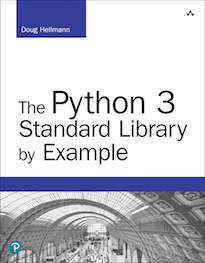OrderedDict — Remember the Order Keys are Added to a Dictionary¶
An OrderedDict is a dictionary subclass that remembers the
order in which its contents are added.
import collections
print('Regular dictionary:')
d = {}
d['a'] = 'A'
d['b'] = 'B'
d['c'] = 'C'
for k, v in d.items():
print(k, v)
print('\nOrderedDict:')
d = collections.OrderedDict()
d['a'] = 'A'
d['b'] = 'B'
d['c'] = 'C'
for k, v in d.items():
print(k, v)
Before Python 3.6 a regular dict did not track the insertion order, and
iterating over it produced the values in order based on how the keys
are stored in the hash table, which is in turn influenced by a random
value to reduce collisions. In an OrderedDict, by contrast,
the order in which the items are inserted is remembered and used when creating
an iterator.
$ python3.5 collections_ordereddict_iter.py
Regular dictionary:
c C
b B
a A
OrderedDict:
a A
b B
c C
Under Python 3.6, the built-in dict does track insertion order,
although this behavior is a side-effect of an implementation change
and should not be relied on.
$ python3.6 collections_ordereddict_iter.py
Regular dictionary:
a A
b B
c C
OrderedDict:
a A
b B
c C
Equality¶
A regular dict looks at its contents when testing for equality.
An OrderedDict also considers the order in which the items were
added.
import collections
print('dict :', end=' ')
d1 = {}
d1['a'] = 'A'
d1['b'] = 'B'
d1['c'] = 'C'
d2 = {}
d2['c'] = 'C'
d2['b'] = 'B'
d2['a'] = 'A'
print(d1 == d2)
print('OrderedDict:', end=' ')
d1 = collections.OrderedDict()
d1['a'] = 'A'
d1['b'] = 'B'
d1['c'] = 'C'
d2 = collections.OrderedDict()
d2['c'] = 'C'
d2['b'] = 'B'
d2['a'] = 'A'
print(d1 == d2)
In this case, since the two ordered dictionaries are created from values in a different order, they are considered to be different.
$ python3 collections_ordereddict_equality.py
dict : True
OrderedDict: False
Reordering¶
It is possible to change the order of the keys in an
OrderedDict by moving them to either the beginning or the end
of the sequence using move_to_end().
import collections
d = collections.OrderedDict(
[('a', 'A'), ('b', 'B'), ('c', 'C')]
)
print('Before:')
for k, v in d.items():
print(k, v)
d.move_to_end('b')
print('\nmove_to_end():')
for k, v in d.items():
print(k, v)
d.move_to_end('b', last=False)
print('\nmove_to_end(last=False):')
for k, v in d.items():
print(k, v)
The last argument tells move_to_end() whether to move the
item to be the last item in the key sequence (when True) or the
first (when False).
$ python3 collections_ordereddict_move_to_end.py
Before:
a A
b B
c C
move_to_end():
a A
c C
b B
move_to_end(last=False):
b B
a A
c C
See also
- PYTHONHASHSEED – Environment variable to control the random seed value added to the hash algorithm for key locations in the dictionary.
 PyMOTW-3
PyMOTW-3